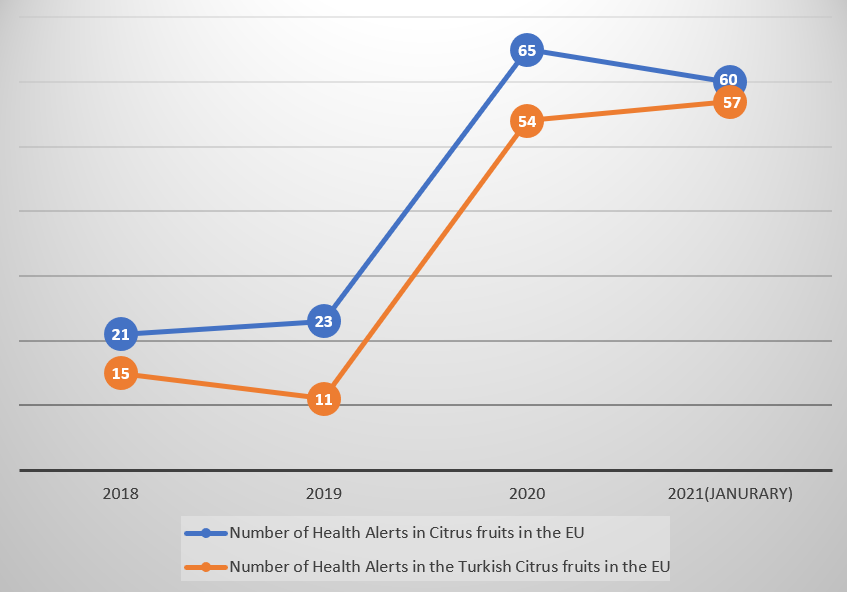EU pesticides regulation pushes out Turkish citrus imports
After shipments of Turkish mandarins, oranges, and lemons to Spain were made in January 2021, the Spanish Citrus Management Committee (CGC) reported that the pesticides loaded in the Turkish citrus exceeded the Maximum Residue Limit (MRL), which is regulated by the European Commission (EC). The Spanish committee further argued that the EU should stop importing citrus from Turkey as the majority of fruit batches even contained pesticides unauthorized in the EU. Considering that the pesticide issues from Turkish citrus fruits have been raised consistently during the last five years, the European Commission is expected to take action to protect the EU agricultural market.
Overview of the Turkish Citrus Export
Turkey is a net exporting country of citrus fruits such as lemons, oranges, and mandarins. According to Tridge data, Turkey is ranked 4th for lemon and 5th for mandarin exports globally in 2019, which is mainly attributable to its warm climate. Moreover, in Turkey, lemons and oranges are in season for almost ten months in a year, and the Mandarin harvest is available from September to April, which covers nearly nine months in a year.
In 2020, despite a decline in overall consumption due to Covid-19, Turkey exported USD 933 million of citrus fruits to the global market, showing a 24% increase compared to the previous year. The main exporting markets were Russia, the Middle Eastern countries, and the EU countries in the eastern European region, mainly due to accessibility.
Export Value of Turkish Lemon (USD), 2012-2019.

Export Value of Turkish Mandarin (USD), 2012-2019.

Export Value of Turkish Orange (USD), 2012-2019.

Source: Tridge
Turkish Farmers overuse harmful pesticides
Compared to the early 2000s, the usage of agricultural pesticides in Turkey increased by 57 percent during the last decade, and the number of farmers dependent on pesticides is rising every year by around 8 percent on average. Recent research conducted by the Ministry of Health in Turkey reveals that 17.3% of random fruit and veggie samples exceeded the pesticide residue limit, and 73 different types of excessive pesticides were detected from samples. Greenpeace also reported that Turkish agricultural products have become contaminated with pesticides and other banned chemical substances, which could eventually cause human health issues in the future.
The pesticide problem of Turkish citruses is often raised by the EU countries almost every year, arguing that Turkish farmers are overusing pesticides and even using poisonous chemicals prohibited in the EU countries. In the 2017/18 season, the EU's Rapid Alert System for Food and Feed (RASFF) detected fifteen health alerts from the Turkish citrus fruit imports. In the following season, The National Health Committee in Bulgaria categorized the Turkish lemon imports as "hazardous" due to the excessive use of pesticides. During the past two years, Turkish citrus fruit's situation in the EU market worsened. The number of health alerts in Turkish citrus in 2020 jumped five times more than in 2019, from 10 to 54, and the number hit the record-high, 57, only during the last month. As the number of Turkish citrus import rejection cases increases, the Spanish committee strongly argued that the EU should implement audit procedures and raise the percentage threshold of mandatory inspection, or even stop importing Turkish products altogether.
Number of Health Alerts in Citrus fruits in the EU, 2018-2021(January)

Source: Rapid Alert System for Food and Feed (RASFF)
Challenges for Turkish Citrus Farmers
The European Commission is expected to take further action to protect the EU market. Since a complete import ban of Turkish citrus fruits is not feasible due to EU countries’ high reliance on the Turkish market, the EU would probably start with a gentle approach such as an intervention. Above all, raising the minimum threshold of inspection for fruit batches could be a candidate solution for the current situation.
Since the 2017/18 season, the EC has been inspecting one or two batches of imported Turkish citrus out of 10 batches to detect pesticide over-usage. Still, the residue issue has remained unsolved even after the inspections were put in place. Therefore, by pushing up the inspection threshold to 30-40%, or if possible, to 50%, the EU could expect fewer health alerts in Turkish citrus fruits in the future. Although there is a high possibility that the EU market, especially eastern European countries could suffer from a citrus shortage in the short term, it is expected that the citrus from Greece and Spain, which are the main competitors, are able to supply more citrus fruit to the market.
Turkish Farmers are projected to confront challenges on citrus production and export if the EU restricts imports on Turkish citruses. As the export volume decreases, there will be more Turkish citruses in the domestic market, leading to lower domestic prices. In the short term, Turkish citrus farmers can mitigate the risk by exporting more citruses in Russia, Iraq, and other Middle-eastern countries that always show high demand for Turkish citruses. However, in the long term, the pesticide issue often raised by importing partners should be considered seriously for the sustainable development of the agricultural sector. Therefore, In order to make Turkish agriculture sustainable, it is necessary to provide guidelines and consultancy on the proper use of pesticides.
Sources:
- Dextra, "Pesticide Usage in Turkey Increases by 57% in last decade"
- DW, "Deadly pesticides in EU produce from Turkey"
- Eurofruit, "Challenges combine for Turkish citrus"
- Freshplaza, "Turkey: Pesticide levels too high in some fruits and veg"
- Freshplaza, "The Spanish CGC demands that the EU stop the import of Turkish citrus fruits with phytosanitary problems"
- Rapid Alert System for Food and Feed (RASFF)
- Tridge, Export and Import data on Lemon(HS Code 080550), Mandarin(HS Code 080520),and Orange(HS Code 080510)
- Tridge,Seasonality Information on Lemon(HS Code 080550), Mandarin(HS Code 080520), and Orange(HS Code 080510)



